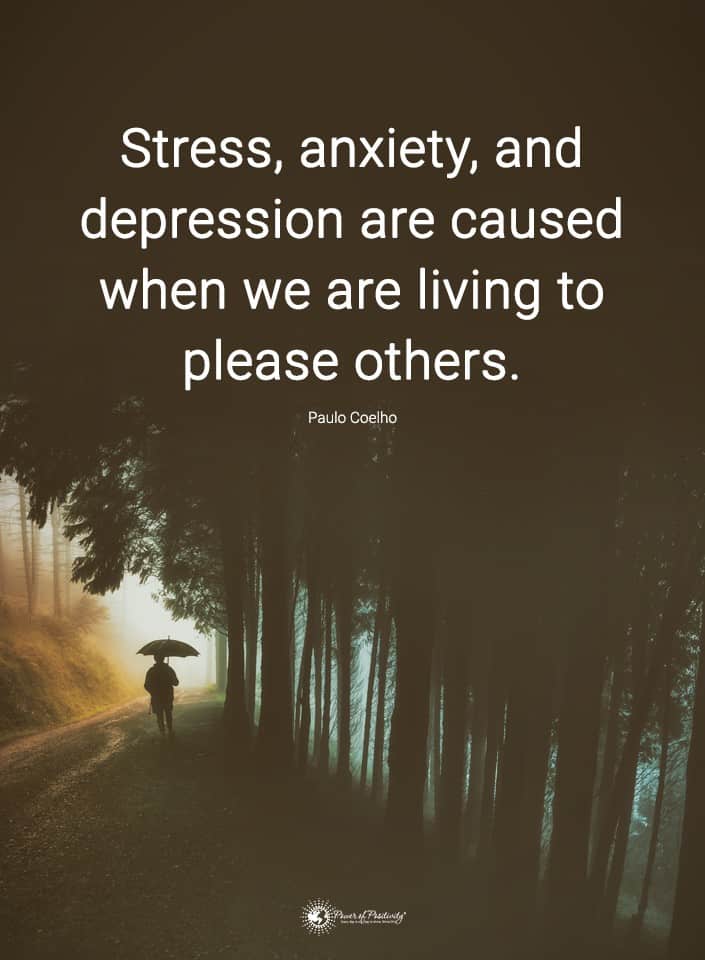Anxiety is a common experience on a very long spectrum. If you’ve ever felt anxious, you know just how horrible it can be. It can even feel debilitating and all-consuming, fighting all logical thought that you know exists. For many, it’s a frightening experience.
Sadly, as with many other issues pertaining to mental health, there’s a lot of misinformation surrounding anxiety that permeates the internet and the world. Knowing what’s real and what isn’t is important if you’re trying to manage your own anxiety. Here are 9 myths about anxiety everyone believes, but aren’t true.
Myth #1 – Anxiety Disorders Are Very Rare
Some people make comments about how “everyone” seems to have an anxiety disorder these days, implying that some of these people are lying or faking it. Unfortunately, anxiety disorders aren’t quite that rare.
 Anxiety disorders are far from uncommon. In fact, they’re the most common mental disorder in America according to the Anxiety and Depression Association of America. 18.1% of the United States population aged 18 and older experience an anxiety disorder.
Anxiety disorders are far from uncommon. In fact, they’re the most common mental disorder in America according to the Anxiety and Depression Association of America. 18.1% of the United States population aged 18 and older experience an anxiety disorder.
That’s a whopping 40 million adults, and that doesn’t include children who begin to experience anxiety in childhood, which is also shockingly common; 25.1% of teenagers have one diagnosed! Here’s how many people have the five main anxiety disorders:
- Generalized Anxiety Disorder (GAD). In America, 6.8 million adults (or 3.1% of the United States population) have GAD.
- Social Anxiety Disorder (SAD). In America, 15 million adults (or 6.8% of the United States population) have SAD.
- Panic Disorder (PD). In America, 6 million adults (or 2.7% of the United States population) have PD.
- Obsessive-Compulsive Disorder (OCD). In America, 2.2 million adults (or 1% of the United States population) have OCD.
- Posttraumatic Stress Disorder (PTSD). In America, 7.7 million adults (or 3.5% of the United States population) have PTSD.
Myth #2 – Alcohol Is A Good Way To Ease Anxiety
When you drink a moderate amount of alcohol, you may notice that you feel a little calmer. It seems, at first, like this is a great trick for getting some liquid courage and feeling brave enough to do those things that make you anxious. You might even feel proud of yourself if you’re careful about only drinking reasonably and safely!
Unfortunately, alcohol’s boost to your positive thinking isn’t just temporary – it’s also counterproductive. Alcohol reduces sleep quality and makes you even more anxious the next day than you were the day before. Basically, the follow-up anxiety to alcohol is worse than the initial anxiety you may have been trying to get rid of!
Worse still, alcohol abuse is often a common comorbidity for those with anxiety disorders. The more reliant you become on alcohol to deal with anxiety, the more likely you are to overdo it, build up a tolerance, or use it as a method for avoiding your problems. You don’t need to quit alcohol if you don’t have an alcohol abuse problem, but you certainly shouldn’t be relying on it to aid your anxiety, either.
Myth #3 – Anyone Can Snap Out Of Anxiety
Anxiety disorders can seem silly to people who don’t have them. But like any mental illness, they don’t exactly resolve on their own. Most people do experience ups and downs with anxiety, meaning some days are worse than others. But even on good days, those with anxiety are still more anxious than those without it.
It’s not uncommon for people with anxiety to be told to simply snap out of it, but that’s just not how it works. Though everyone experiences occasional moments of anxiety, those with anxiety disorders have these issues chronically in a cycle. Most with anxiety disorders will require regular treatment in order to see any improvement in their state.
Myth #4 – Anxiety Has No Effects On Physical Health
Anxiety is a mental condition, so many people falsely believe that it’s just “in the head” and can’t affect any other part of the body. This is completely incorrect. Studies have actually found that people with anxiety can have such severe physical symptoms that they test within certain ranges equivalent to those with heart conditions, diabetes, and other problems. Here are some ways anxiety affects the physical body:
· Respiration
Those with anxiety can often experience shallow or rapid breathing. Those who also have respiratory disorders, such as chronic obstructive pulmonary disease, anxiety-related complications can worsen the risk of becoming hospitalized. Anxiety can also worsen symptoms of asthma.
· Immunity
When you experience anxiety, your body responds via a fight-or-flight instinct. This heightens the body’s pulse and breathing in order to supply you with the components you need to survive a situation, at the expense of other basic functions of the body. This is useful when you need it, but bad when it’s chronic, as your immunity is impaired by a constant fight-or-flight scenario.
· Cardiovascular Issues
Constant anxiety adds to the risk of high blood pressure, palpitations, chest pains, and other cardiovascular issues. It certainly also doesn’t help that it’s easy to confuse panic attacks with heart attacks.
· Digestion
You may have noticed that when you’re under severe stress, your stomach gets queasy. Anxiety disorders commonly affect the gut, leading to bowel movement problems, stomach pain, appetite changes, and even nausea. For some, it can also be a risk factor for diseases like irritable bowel syndrome.
Myth #5 – Those With Anxiety Should Make Sure To Avoid Stressful Situations
It is genuinely simply not possible to avoid stress in life. Plus, it’s completely counterproductive to try. On the surface, it seems like avoiding anything that induces anxiety can reduce it in the long run, but that’s neither simple nor actually effective. This is because:
- Viewing yourself as a fragile person in need of protection through avoidance only results in additional anxiety
- Reduced exposure to everyday stressors can separate you from reality and make you even less used to it
- Treating everyday sources of anxiety as things to be avoided turns them into enemies, reinforcing the idea that they are frightening or worth being anxious over
Of course, you shouldn’t throw yourself directly into the heart of what makes you anxious. Instead, try slowly and safely exposing your mind and self to things that cause anxiety. The world is full of causes of stress, and effective treatment of anxiety encourages a patient to learn that they can be courageous and accomplish tasks even when they are anxious!
Myth #6 – Social Anxiety Is Just Being Shy Or Introverted
Comparing introverted traits to social anxiety is like comparing mild sadness to major depressive disorder. These two things are so far apart on the spectrum that they’re simply not comparable at all.
Social anxiety refers to a significant fear or worries surrounding social performance and situations, typically to the point of significant fear, worry, or obsession with their own and other people’s behavior. The Diagnostic and Statistical Manual of Mental Disorders, 5th Edition lists the following as some of the symptoms of a social anxiety disorder or social phobia:
- Avoidance of social situations that can produce anxiety or simply barely enduring them by attempting to manage intense fear
- Anxiety that is not proportional to the situation
- Intense or persistent anxiety and/or fear relating to specific social environments and situations due to a fear of being humiliated, judged, or embarrassed
- A daily livelihood that is interrupted or harmed by the distress or anxiety
This is extremely different from simply being a shy person. It’s true that those who are shy could have a higher risk for developing social phobias, but that doesn’t mean they are the same thing. The difference in distress levels is noticeable.
Myth #7 – Anxiety Must Be Treated With Medication, And It Takes A Long Time
In this day and age, there are plenty of applicable and safe ways to treat anxiety that don’t involve the use of medication. There is absolutely nothing wrong with using medication to manage anxiety, but if that’s not the right path for a patient, there are lots of other choices, including:
- Exercise
- Meditation
- Group-based strategies
- Problem-solving strategies
- Relaxation techniques
- Cognitive-behavioral therapy
- Combinations of different strategies
On top of that, many people begin to notice improvements in the symptoms of their anxiety within weeks or months of their treatment progress. This means it doesn’t take forever to begin getting better, and many people find that the right treatment plan tailored to their needs works wonders for quicker recovery and management.
Myth #8 – Anxiety Disorders Are Obvious To Everyone
Some people’s anxiety disorders may certainly present in obvious ways, but in most cases, onlookers will simply not notice the existence of the disorder at all. The lack of obviousness does not dictate the severity of someone’s anxiety, though. This is because an anxious individual may:
- Employ coping mechanisms to hide their anxiety
- Make use of excuses to explain certain behaviors
- Avoid situations that could trigger their anxiety
- Feel ashamed of showing any of their symptoms
- Experience anxiety that is very specific to certain situations
- Experience panic attacks or anxiety symptoms openly in private and repress them in public
- Have psychological anxiety symptoms that do not manifest physically
Myth #9 – Deep Breathing, Self-Care, and Natural Remedies Solve Anxiety
Social media pages are often overrun by people who claim that all sorts of natural products cured their anxiety. Sure, making use of relaxing methods can help you feel calmer, but anxiety disorders can’t be eradicated by taking a nice bath. That’s like slapping a band-aid on a bullet wound!
You may have seen people claim that the following things can cure anxiety:
- Essential oils
- Herbs and herbal remedies
- Taking time for self-care
- Meditation
- Exercise
- Eating healthily
- Acupuncture
- Relaxing teas
- Just taking long breaks
None of these things on their own will cure anxiety. They can certainly help and there’s no reason you shouldn’t employ calming methods in your everyday life if you’re trying to better manage anxiety, but don’t expect them to magically fix everything!
 Final Thoughts About Some Anxiety Myths Everyone Believes But Aren’t True
Final Thoughts About Some Anxiety Myths Everyone Believes But Aren’t True
There are many things about anxiety and other mental health issues that we still don’t know, and buying into myths about anxiety certainly doesn’t help matters. If you’re seeking aid for your anxiety or trying to learn about anxiety to help someone in your life, make sure that the information you absorb is accurate!



















